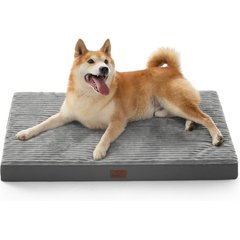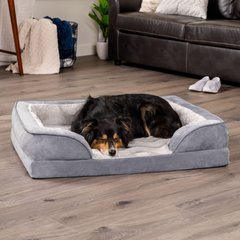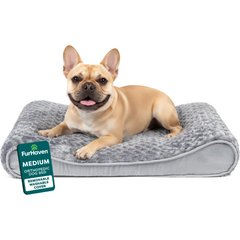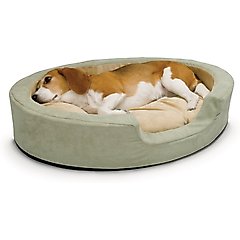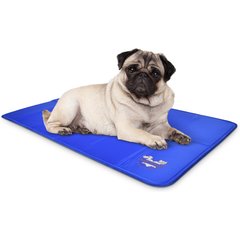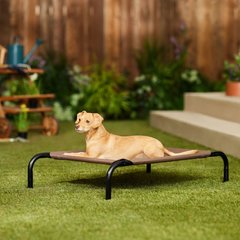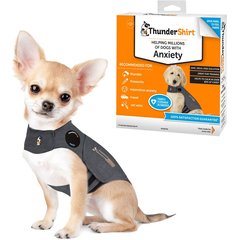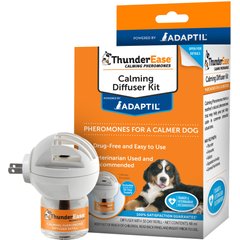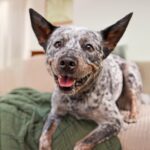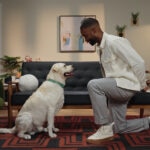Understanding Dog Body Language in Senior Dogs

Photo by Mary Swift/Getty
As our dogs age, we need to be aware of the changes they experience. Our dog’s body language can provide clues into how they are feeling. But while dog body language has some universal hallmarks, and many body language postures remain the same throughout a dog’s life, senior dogs experience both physical and mental shifts that can impact how they communicate with us. Understanding dog body language in senior dogs can help you stay vigilant over the health and happiness of your aging pet.
By understanding your senior dog’s body language, you can better understand what they are trying to communicate and if the response is a natural part of the aging process or indicates an underlying health problem.
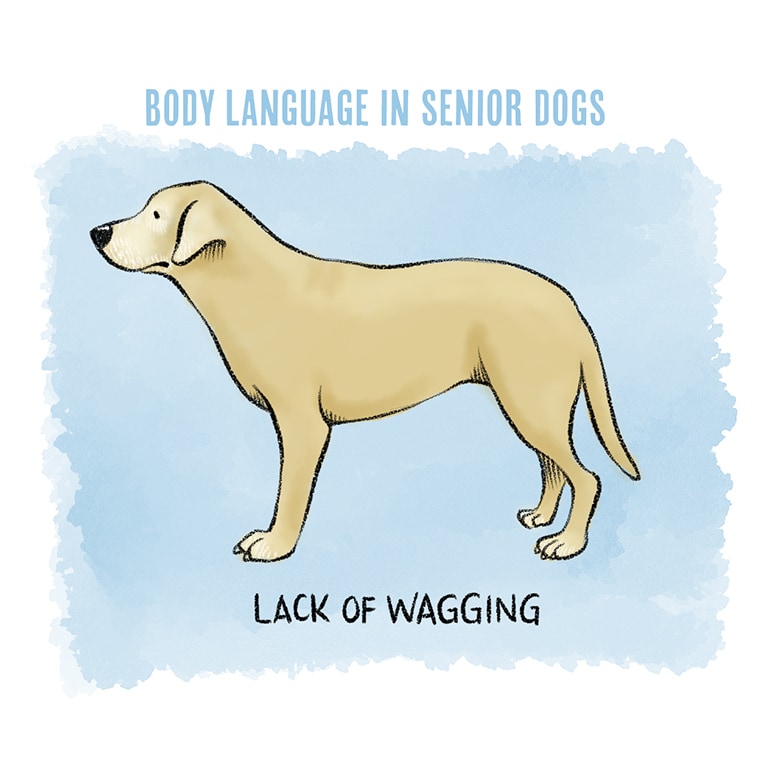
By Bambi Edlund
Lack of Tail Wagging
Younger dogs wag their tails to indicate a variety of emotional states, from happiness to tension, but a dog’s most beloved communication aid can suffer the effects of aging as well.
What it looks like:
A senior dog’s wag might be slower or lower, or you could observe an old dog not wagging their tail at all. The tail might droop completely, almost as if it’s not fully attached to the body. Depending on the reason for the lack of wagging, a dog might hunch their back and move carefully, or the discomfort might be specific to just the hind end and the rest of the body posture might appear normal.
What it means:
An old dog not wagging their tail might be due to cognitive decline, stress, arthritis or pain from a condition called limber tail syndrome.
How to respond:
Pet parents should track their dog’s reactions to typical interactions to determine if the lack of wagging is related to general cognition issues or if the universal lack of wagging is pain based. A visit to the veterinarian will help to rule out injuries and provide pain management medication if necessary.
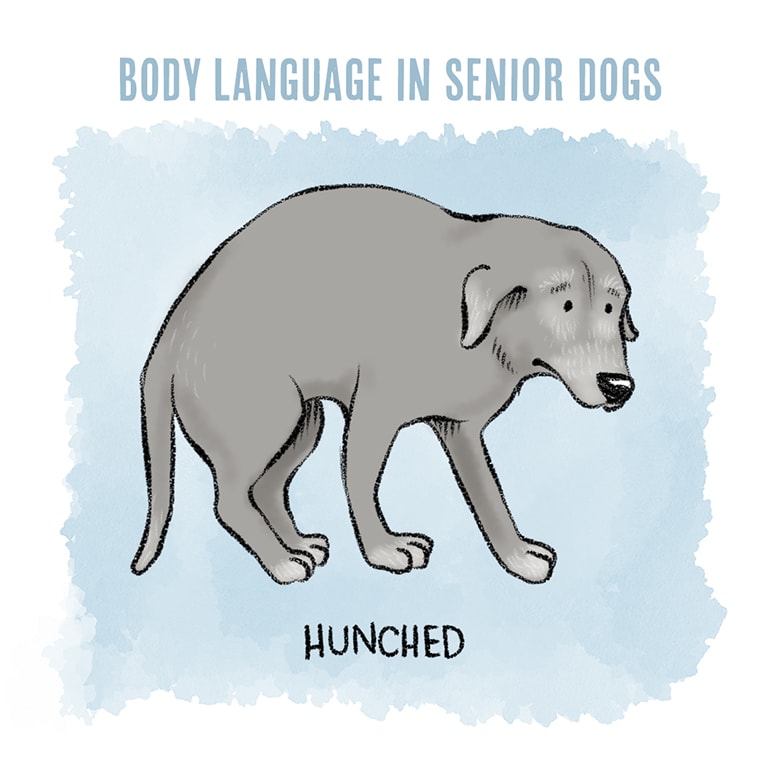
By Bambi Edlund
Hunched Posture
In understanding dog body language, it’s important to note that a dog’s overall posture—from the direction of a lean to the position of the paws—is typically an indication of varying emotional states.
What it looks like:
Due to discomfort, a senior dog might not have the flexibility to assume anything other than what might be misconstrued as a submissive or frightened posture, characterized by a hunched back, possibly with the dog’s hair standing up. This position will likely also impact how the dog holds their head and tail, with both pointed toward the ground. The dog also might hold their ears flattened against their head.
What it means:
A hunched back can signal a variety of possible medical issues, from bladder, kidney or stomach conditions, to arthritis.
How to respond:
As with any dog body language that telegraphs possible pain, pet parents should seek out support from their veterinarian to assess the severity of the issue.
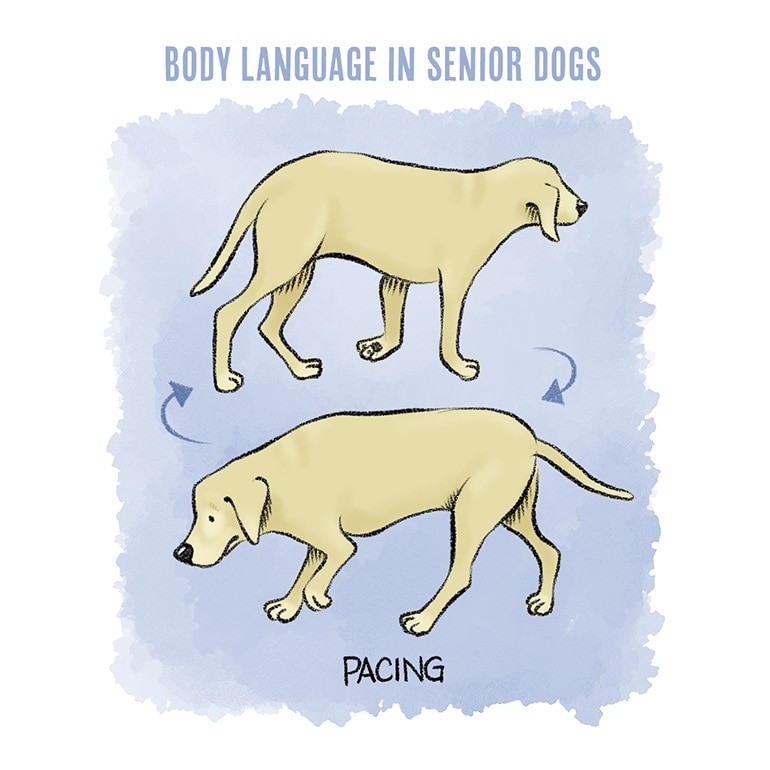
By Bambi Edlund
Pacing
Older dogs might walk the same route or repeatedly turn in circles, particularly at night.
What it looks like:
Younger dogs zip around endlessly, burning off their excess energy, but when a senior dog has a hard time settling down it can look repetitive and ritualistic. A senior might pant as they pace, looking off into the distance or staring at the ground. They might turn in full circles or half circles, or repeatedly drift in a specific direction. A pacing dog may act as if they have a specific goal that they’re never able to reach.
What it means:
This type of compulsive behavior might be related to cognitive decline or could indicate an underlying medical condition like Cushing’s disease, abdominal pain or a brain tumor. Senior dogs might also pace if they’re unable to find a comfortable place to rest.
How to respond:
Providing dog beds that are easy for senior dogs to get in and out might help a pacing dog settle down
Recommended Products
Pet parents should also track the timing and frequency of their dog’s pacing and schedule an appointment with their veterinarian to determine if the dog is dealing with a medical issue. Senior dogs who pace at night due to a medical condition, such as canine cognitive dysfunction, might benefit from medication. A report from Washington State University’s Veterinary Teaching Hospital cites selegeline (Anipryl) as a possible treatment for CCD. You can discuss the possibility of this and other medications with your veterinarian.
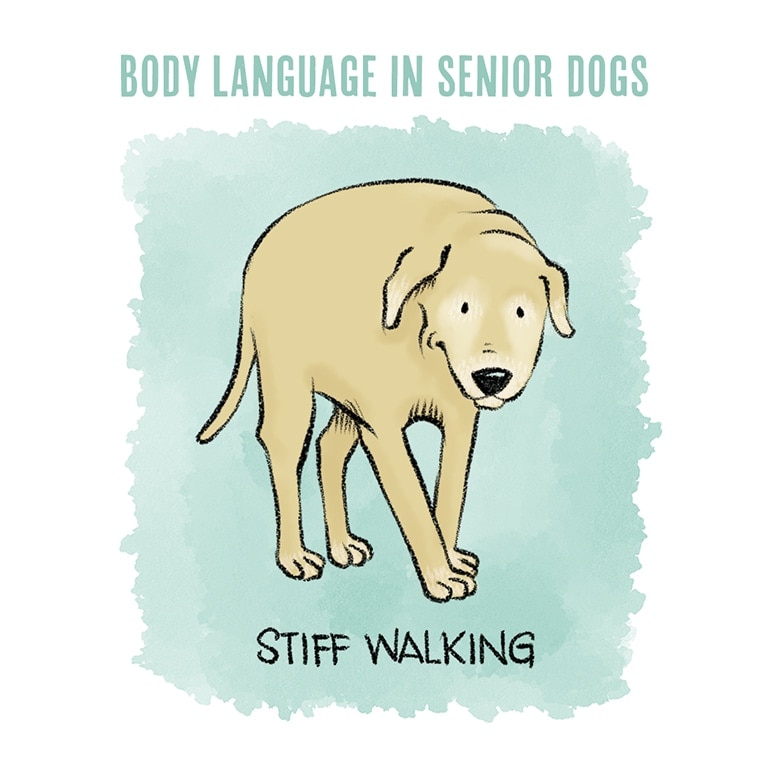
By Bambi Edlund
Stiff Walking
While a stiff gait in younger dogs can telegraph stress or arousal, senior dogs might move with a rigid gait for reasons unrelated to their emotional responses.
What it looks like:
Dogs naturally lose some of the pep in their step as they age, but some senior dogs’ gait can change to include everything from slower, inhibited walking to a limp. A senior walking with a stiff gait might move one leg more slowly than the others, as if out of rhythm. The foot may drag slightly so the knuckles move along the ground instead of the paw pads. The rear legs might also move in tandem instead of individually. Dogs experiencing pain that leads to stiff walking might compensate by arching their back, bobbing their head or angling their tail to alleviate pain.
What it means:
Age-related aches and pains, arthritis and injuries can contribute to a dog’s mobility issues.
How to respond:
Pet parents should schedule a veterinarian appointment to rule out medical problems beyond normal age-related decline and discuss long-term pain management options.
Depending on the cause of your senior dog’s stiff movement, your vet may recommend a supportive orthopedic dog bed.
Recommended Products
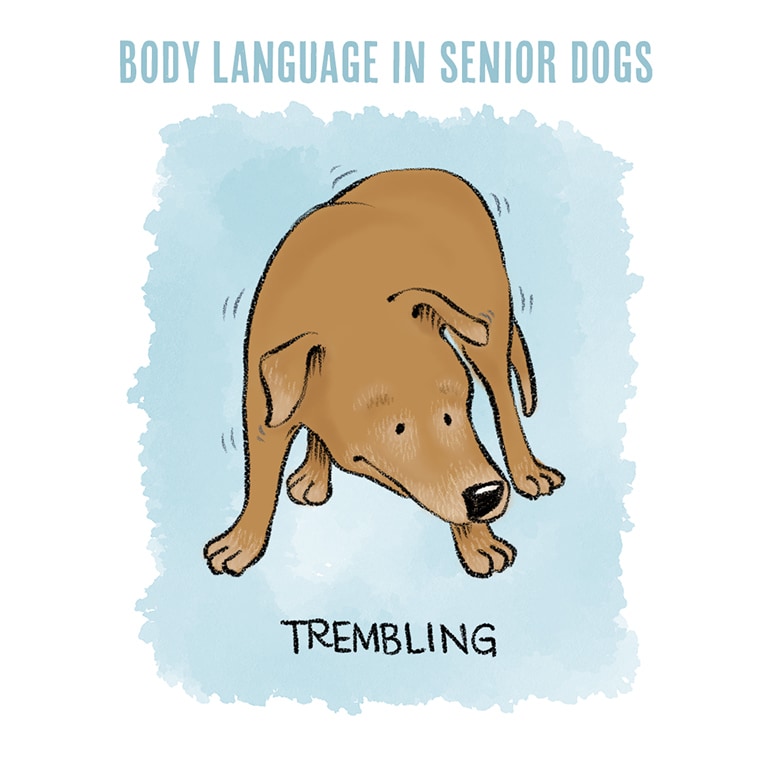
By Bambi Edlund
Trembling
Typically, a dog might tremble when fearful, confronted with something stressful, or when coping with injury or muscle weakness.
What it looks like:
A senior dog might shake while standing up or while resting. This can involve the entire body, with trembling reaching from the head to the tail, or specific parts like just the head or back legs. Depending on the reason for trembling, the dog might cower or hunch over, or the dog’s posture might remain neutral with just the impact region shaking.
What it means:
If a senior dog’s trembling seems out of context in the situation (meaning there’s no obvious stressor), it might point to a pain-based reaction, muscle weakness, cognitive dysfunction or a stress reaction related to dulled senses. Senior dogs also have difficulty regulating their body temperature, so trembling might indicate that the dog is cold even if the climate feels mild.
How to respond:
If senior dog’s trembling is excessive, prolonged and can’t be addressed by adjusting he temperature, a veterinarian should assess the dog to determine if there’s an undiagnosed injury or medical condition.
If your vet finds that your dog is trembling due to temperature regulation issues, talk to them about using a heated dog bed or a dog sweater to keep your senior dog warm.
Recommended Products
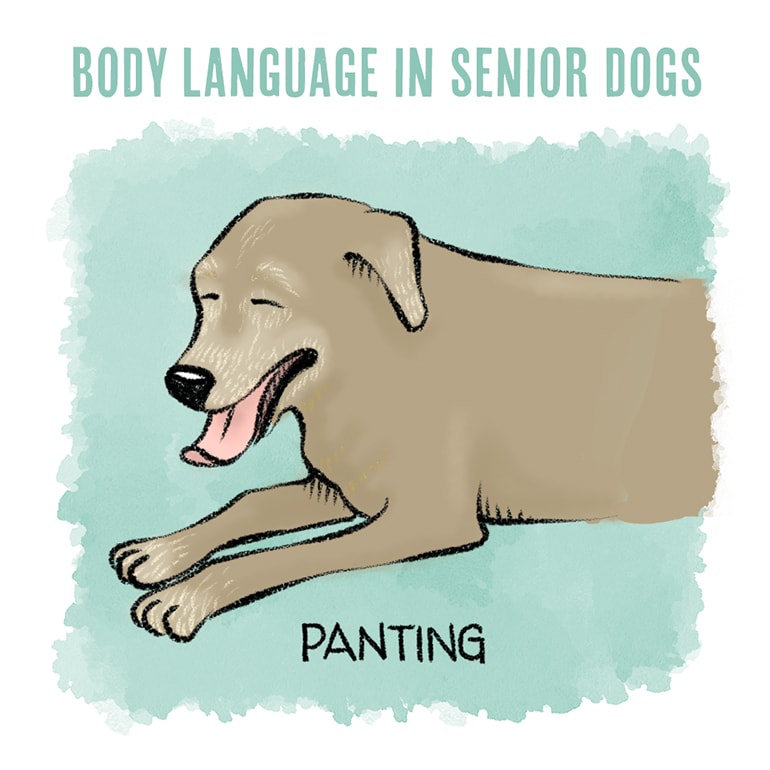
By Bambi Edlund
Panting
In addition to helping a dog cool off, panting, or the sudden cessation of panting, can indicate stress.
What it looks like:
Depending on the reason for panting, a dog might stand still and pant rapidly with a wide mouth and eyes closed, or the dog might pace back and forth while panting.
What it means:
We generally believe senior dogs pant to telegraph stress or anxiety, but because it’s difficult for seniors to regulate their body temperature, they might be more likely to pant even in mild weather. Excessive panting in senior dogs can also indicate health problems like Cushing’s disease, heart issues or respiratory disorders. Senior dog panting could also be a stress reaction to dulled senses in relation to a change in their home environment, or due to cognitive decline, as noted in a study by Amy L. Pike, DVM, DACVB and published by the Michigan Veterinary Medical Association.
How to respond:
Monitor a senior dog’s panting to determine if it’s related to temperature or stress and schedule a check-up to rule out any underlying medical conditions.
If the panting is temperature related, consider a cooling dog mat or an elevated dog bed to help regulate your senior pup’s temperature.
Recommended Products
If your dog’s panting is due to stress, talk to your vet about potential solutions like Thundershirts, calming diffusers, or medication.
Recommended Products
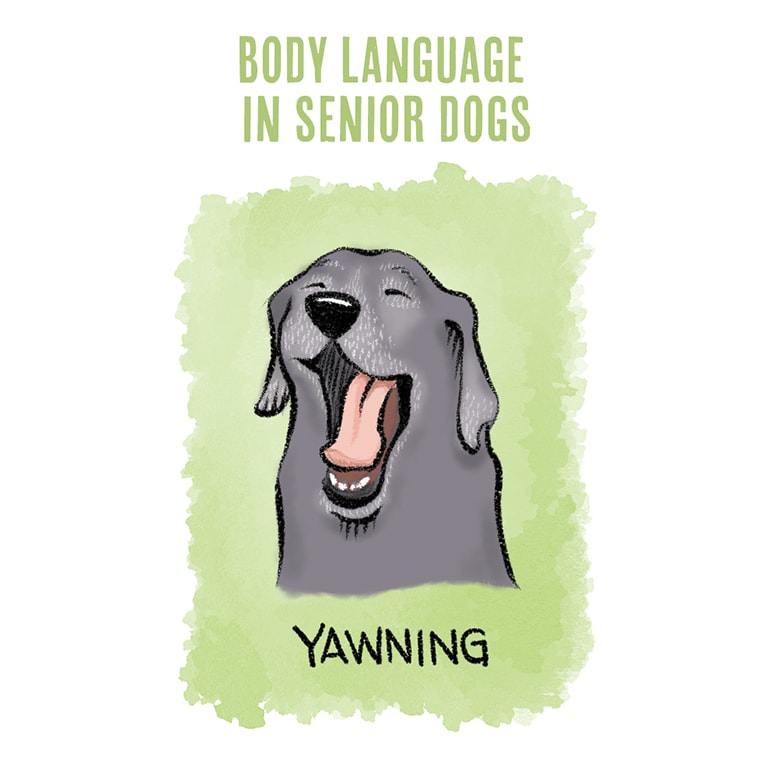
By Bambi Edlund
Yawning
Yawning is a common indicator of fatigue, but in dog body language, it may also telegraph anxiety, stress or fear.
What it looks like:
Senior dog yawning can occur at any point and may repeat frequently. The yawn might be a quick open-and-close movement, or it might be a prolonged, wide-open mouth movement during which the dog closes their eyes and flattens their ears against their head.
What it means:
Senior dogs who yawn excessively might be experiencing confusion due to dulled senses or cognitive decline.
How to respond:
Even old dogs can learn new tricks, so training can help to focus senior dogs who feel unsettled or anxious. Sticking to a predictable schedule and introducing basic rewards-based training in a daily routine can help a nervous senior dog feel more centered.
Hopefully this guide has been beneficial to you in understanding dog body language in your older canine. Remember that speaking to your dog’s veterinarian is vital in decoding common body language that your senior may display, as well as in addressing any underlying health problems that they may indicate.
